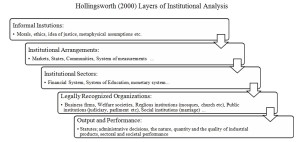Modern Structure of Knowledge and Criticism of Islamic Banking
By Omar Javaid
Islamic banking is growing by leaps and bounds in the world, many sees this as a successful utilization of Islamic principles to solve worldly problems whereas others considers it as a mistake of putting a label of ‘Islamic’ on various things which are prohibited or disliked by Islam. These two groups often debate and counter argue with each other on different forums to prove their points. It is interesting to note that the opponents are often sincere and well intentioned Muslims, and it is even interesting to note that most of their disagreements isn’t on the principles of Islam, rather on their perspective of viewing the banking system (a value neutral structure or a institutionalized form of greed and economic injustice) of the western capitalistic world.
The proponents of Islamic banking seems to stick with the text book description of the banking and economic system, whereas the opponents take a deeper and broader look (not necessary that they are right all the time) and claim to know a little more of an alternative perspective of how system works which isn’t explicitly elaborated in text books. The reason for such discrepancy is worth probing.
The text books are written not to inform its audience but to prepare their minds and hearts to become a productive tools of the system. Text books indoctrinate the ideas and concepts approved by those in power. The text books in a communist societies would therefore be very different from those found in a capitalistic ones, for example.
Furthermore modern knowledge is extremely compartmentalized due to its rationalistic roots.
Michael Foucault account of Pierre Rivière is an interesting elaboration of above two features of specialized knowledge contained in text books.
Pierre Rivière who murdered his mother and sister, later wrote his autobiography. After reading his autobiography Rivière was declared a historian by the historians of his time, an artist by the artist community, a criminal by legal experts, and a madman by psychologists. etc. So who Rivière really is? a historian, an artist, a criminal or a madman? or all of it? The answer is further found in Foucault’s work; the knowledge which is dominant politically would eventually define who Rivière is, and subsequently determine his fate. For example if its Psychology which dominates the other, then the legal system wouldn’t be able to punish Rivière as he is a madman, he would rather be admitted into a psychiatric hospital, and if the Legal experts or their knowledge dominates, then Rivière might be given a capital punishment for being a murderer.
Knowledge of economics and finance is also compartmentalized in a same way. An economists view of a bank is different from that of a finance fellow. A banker sitting inside the bank would view it differently then an expert of econometrics sitting in the central bank. Similarly a Masters in Business Administration (MBA), a Chartered Accountant, a Masters in Economics, and a student of Economic Philosophy would have very different view of the system. Rather none of them would have the capacity to imagine the system in its entirety.
This doesn’t end here, the compartmentalization even goes deeper, for example an MBA with majors in Marketing, HR, Finance, Risk Management etc, would also have knowledge pertaining to different aspects of their domain. So we have sub-domains inside domains of specialization in the modern structure of knowledge. Furthermore we also have schools of thought in nearly all disciplines.
In economics we have Classical, Neo-classical, Keynesian, Austrian, liberal, Neo-liberal, Marxists schools etc. Often these schools differs with each other substantially on how they view all or any specific component of the financial and economic system and how it may function or regulated.
Now those criticizing or propagating Islamic banking differs due to the difference in their knowledge base. It is unfortunate that the proponents considers the politically distorted, non-neutral and text-bookish description of how the system works, to be true and comprehensive enough to apply shariah knowledge.
The question now arises that how we may understand the system or all aspects of it completely. The answer is simple, study all perspectives, particularly go deep down in history to understand how a system or some of its component evolved; study the values, norms, ideals, challenges of a particular time in history of a particular society which encouraged formation of a particular institution or set of institutions (system) or shaped it in a form we see today.
In this context Hollingsworth (2000) had proposed a very useful framework to study institutional structures at five different levels. This framework is comprehensive enough to visualize the entirety of the institution and the environment in which it exists.

The proponents of Islamic finance need to realize the short coming in their understand of the system. The Ulema-e-Kiram who are not experts on the subject need to understand how modern structure of knowledge is compartmentalized and how text books contain inadequate and unreliable description of the system, and that experts of a particular area wouldn’t know much about other interrelated domains of his field. Realization of this feature of modern knowledge, would enable the ulema-e-kiram to correctly understand the system before putting a label of Islamic or issueing a fatwa for legitimacy of the system as a whole.

I’m extremely pleased to find this site. I wanted to thank you for ones time due to this wonderful read!!
I definitely enjoyed every little bit of it and I have you saved to fav to look
at new things in your site.
thanks mr omar you wrote that blog really well
Assalamu Alaikum Wa Rahmatul hay Wa Barkatahu
You may browse through the following to differentiate between capitalism and Islamic economic system.
A Tale of Two Economies (Part I):
https://www.linkedin.com/pulse/tale-two-economies-societies-part-i-muhammad-rizwan-ul-haque?trk=pulse_spock-articles
A Tale of Two Economies (Part II):
https://www.linkedin.com/pulse/tale-two-economies-societies-part-ii-muhammad-rizwan-ul-haque?trk=pulse_spock-articles
May Allah SWT guide us to understand HIS words in its true sense (Ameen).
Wassalam
Muhammad Rizwan-ul Haque